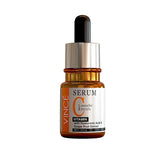Why is Vitamin C important for your body?
The diversity in colors and flavors we observe in zesty oranges, red hues of strawberries, and tangy kiwi hints at nature’s variety. However, there is a shared presence of an element in them commonly known as Vitamin C.
In this article, we will unravel the mysteries surrounding this element. It will specifically shed light on the Benefits of Vitamin C for health, its sources and supplements. On hitting the conclusion, you will have a comprehensive understanding of Vitamin C and how it fits into your wellness routine.
What is Vitamin C?
It is an essential water-soluble nutrient that goes by an alternate name, L-ascorbic acid. Our body desperately needs it for proper functioning but cannot produce it. So, we rely on dietary intake and supplements to fulfill the demand.
Benefits of Vitamin C For Health
In this era of wellness trends, Vitamin C is an antioxidant powerhouse with tons of benefits. Ranging from boosting our immunity system to its impactful contribution to youthful, glowing skin, it potentially works like a magic pill. What more benefits can you get out of it? Read on to get a comprehensive understanding.
Important Link: Guide to Applying Vitamin C Serum for Maximum Benefits
Benefits of Vitamin C For The Body
1. Enhancing Immunity
The primary role of Vitamin C, being an antioxidant, is to strengthen the immunity system. It stimulates the production of white blood cells and protects the cells from free radicals.
2. Combating Diseases
Vitamin C is capable of boosting the level of antioxidants in our blood. That, as a result, declines the risk of many chronic diseases, including heart issues and cancer. It moderates our blood pressure, the root cause of several health issues.
3. Gout Prevention
A type of arthritis, namely Gout, is linked with inflammation of the joints and swelling. One of its major causes is the accumulation of excessive uric acid in the blood. Vitamin C indirectly reduces the probability of Gout by managing the Uric acid level.
4. Iron Absorption
Iron boosts the production of red blood cells and serves as a vehicle to transport oxygen throughout the body. Vitamin C improves iron absorption and lets you get its abundant advantages.
5. Risk of Dementia
Low Vitamin C intake is strongly associated with Dementia, an umbrella term encompassing memory loss and thinking concerns.
Important Link: Best Vitamin C Serum for Acne Prone Skin in UAE
Benefits of Vitamin C For Skin

1. Collagen Production
Collagen production has a dependency on Vitamin C, a cofactor that activates the synthesis of collagen. So, Vitamin C deserves credit for all the effectiveness of collagen for the skin. The production of collagen is famous for dealing with the following set of skincare concerns:
- To treat and delay wrinkles and fine lines
- Prevent Skin Sagging by promoting skin elasticity and firmness
- Wound healing is linked to the production of collagen
2. Hyperpigmentation
Vitamin C takes hold of melanin and controls its overproduction. It will help fade the dark spots on the skin and promote even skin tone.
3. Protection Against Sun Damage
Vitamin C’s role as an antioxidant is handy to tackle the oxidative stress caused by UV light. Free radicals are the primary cause of sun damage. And the Vitamin C defense mechanism is trained well to deal with them.
4. Addressing Under-Eye Circles
Vitamin C addresses various concerns regarding sensitive and gentle skin around the eyes in the following ways:
- Hydrating under the eye area
- Eliminating the appearance of fine lines
- Brightening the under-eye area by diminishing dark circles
Important Link: 7 Benefits of Vitamin C Serum For Oily Skin
Sources of Vitamin C
1. Vitamin C in Your Diet
The reasons why Vitamin C is important in our lives are now quite evident. To consume an appropriate amount of Vitamin C for the body, following fruits and vegetables carry it in significant quantities.
- Citrus: Kiwi, Oranges, Lemon and Grapefruits
- Berries: Strawberries, Raspberries, Cranberries
- Tropical Fruits: Mango, pineapple, papaya, and guava
- Bell Peppers: Whether red, green or yellow
- Cruciferous vegetables: Broccoli, Brussels sprouts, Cabbage, Cauliflower
- Other vegetables: Tomato and potato
2. Vitamin C supplement
Supplements are an effective way to ensure the body gets plenty of Vitamin C, specifically if your diet lacks fruits and vegetables.
Vitamin C-based Skincare Products
A small portion of Vitamin C via our diet gets access to our skin. So topical application is essential to get optimal benefits of Vitamin C on our skin. Many Vitamin C-based products are available in the market, formulated for optimal results. The most common ones are:
Vitamin C Facewash
The Vitamin C-induced facewash washes off impurities with a burst of antioxidant protection.

Vitamin C Creams
Creams and moisturizers stay on your face longer than cleansers. So Vitamin C creams are better performers in reviving the skin’s natural glow and combating signs of aging.
Vitamin C Serums
Serums are the concentrated version, the finest replacement, and go-to options for your skin. Vitamin C serums provide an antioxidant powerhouse for youthful radiance and an even-toned complexion.

Conclusion
Vitamin C is a well-known anti-oxidant that offers a profound role in strengthening the immune system. Vitamin C-rich foods and supplements in your daily regimen can provide several advantages, including white blood cell production and protecting cells against free radicals. They also play a significant role in fighting chronic and many other health concerns and support iron absorption.
The body does not produce Vitamin C. We need to acquire it via diet or supplements. Strawberries, citrus fruits, broccoli, tomato and potato are among the many options available to meet the body's Vitamin C requirements. Furthermore, to nurture the skin for extra glow and enhance collagen production, Vitamin C serums are the ultimate choice of experts.
Important Link: Tips for Choosing the Best Vitamin C Serum for Your Skin
Frequently Asked Questions (FAQs)
Q1. How does vitamin C support the immune system?
Vitamin C is an immune booster and acts as a savior in many parts of the immune system. It is involved in white blood cell production, whose role in defending the body against infections is well known. Additionally, they enhance the functionality of these cells and protect them against free radicals and other harmful molecules. Acting as an antioxidant, it has another role as a supreme skin barrier and protects it from external factors, including the sun.
Q2. What are the signs of vitamin C deficiency?
A few symptoms of Vitamin C deficiency are observed on the skin, nails and hair. These include dry and damaged skin with rough and uneven textured skin, bent body hair shaped as coil, hair follicles turned red and concave-shaped nails that become thin and brittle. Other symptoms involved unhealthy weight loss, compromised immunity, Iron deficiency causing Anemia, slow-healing wounds, fatigue and mood swings, weakening bones and achy joints, bleeding gums and tooth loss in the worst-case scenario.
Q3. How does vitamin C boost collagen production for healthy skin?
Collagen is responsible for repairing and firmness of the skin. Vitamin C has a significant role not only in collagen production but also in preserving the structural integrity and stability of collagen fibers in the skin. In response, this collagen gives a youthful look and glow and combats signs of aging.
Q4. Can vitamin C reduce inflammation and chronic disease risk?
Vitamin C is an antioxidant that neutralizes free radicals in the body, reducing oxidative stress and strengthening the immune system. That is the reason why Vitamin C is important in reducing inflammation and the risk of chronic diseases, including heart issues, diabetes and even cancer.
Q5. What is the recommended daily intake of vitamin C?
The recommended dose of daily vitamin C differs based on age and gender. For instance, men should aim for 90 milligrams (mg), and women are required to consume 75 mg. Pregnant and lactating women, as well as smokers, need a few extra milligrams.

 KSA
KSA












